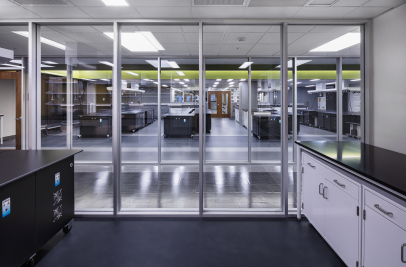St. Louis may be famous for the Arch among tourists but within the medical field, Washington University School of Medicine in St. Louis is famous for its advanced research and prowess in teaching future doctors and scientists. The school took a step further into the future when the new Mass Spectrometry Center opened.
Designed by KWK Architects and constructed on the fourth floor of the Medical School’s 4444 Forest Park Ave. building, adjacent to the MGI (McDonnell Genome Institute) and Informatics Institute, the new Mass Spectrometry Center features 8,000-sq.ft. for new instruments, sample preparation, computational analysis, and training of medical students, post doctorates, and fellows.
Mass Spectrometry is an analytical laboratory technique used to separate the components of a sample by their mass and electrical charge. Described as the smallest weigh scale in the world, not because of the mass spectrometer’s size, but because of the size of what it weighs — molecules. Over the past decade, mass spectrometry has undergone tremendous technological improvements allowing for its application to proteins, peptides, carbohydrates, DNA, drugs, and many other biologically relevant molecules.
Higher education design experts KWK Architects worked with the university’s Faculty Design Committee and engineering team to design this new space, which includes:
- An open instrument lab for up to 20 mass spectrometers
- Expansion space for an additional four mass spectrometers
- Wet lab bench space for sample prep. (approx. 1,700-sq.ft.)
- Three private offices for on-site staff
- Six technology spaces
- Sixteen touchdown spaces for visiting users
- Collaboration/kitchenette space
- A large conference room with two huddle rooms
- A lactation room
KWK designers specified sustainable materials for the renovation that would provide long-term durability and low maintenance. Casework, flooring, and ceiling products with high-recycled content and low VOC (volatile organic compound) emissions, along with zero VOC paint were specified to create a sustainable project. Construction on the project was completed in fall of 2021.
Since 2015, KWK has worked on over 50 design and study projects on the School of Medicine Campus. These include projects outlined in the master plan and additional enabling projects that have helped support campus growth and recruitment activities. Recently completed projects were the final phase of the 2015 Phase One Education Renovation Plan.
Want to tweet about this article? Use hashtags #construction #sustainability #futureofwork #infrastructure


